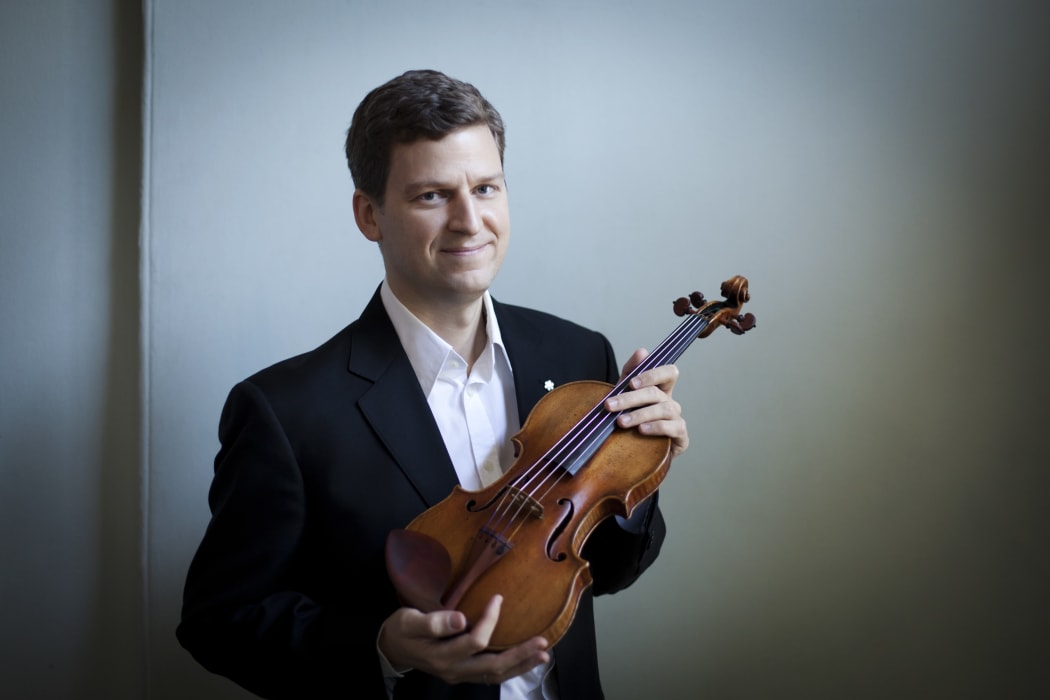Love is in the air.
Canadian James Ehnes joins the Auckland Philharmonia for this 2022 season finale, playing Leonard Bernstein's violin concerto inspired by Plato writing about love. The concert ends with Prokofiev's ballet music for the star-crossed lovers Romeo and Juliet.

James Ehnes Photo: Benjamin Ealovega 2012
BEETHOVEN: Egmont Overture
"Hark! Hark! How often has this sound summoned my joyous steps to the field of battle and of victory! How bravely did I tread, with my gallant comrades!… And now, from this dungeon I shall go forth, to meet a glorious death; I die for freedom …"
So read the triumphant near-final words of the titular hero of Goethe’s play Egmont: A tragedy in 5 Acts as he heads to his execution.
The play premiered in 1814, and it arrived in final form with incidental music by Beethoven.
While Beethoven held his senior in great esteem, Goethe noted that Beethoven had "an absolutely uncontrolled personality, he is not altogether wrong in holding the world detestable, but surely he does not make it more enjoyable for himself or others by his attitude."
He did concede though, that "Beethoven has done wonders matching music to the text."
BERNSTEIN: Serenade
Leonard Bernstein’s Serenade (1954) originally bore the title Symposium.
In 1986 he told his biographer: "I was dissuaded from that title because people said it sounded so academic. I wish I had retained it so people would know what it is based on… it is seven after-dinner speeches at a banquet… it is really a love piece…. the music, like Plato’s dialogue, is a series of related statements in praise of love…the relatedness [of the movements] relies on a system whereby each movement evolves out of the elements of the preceding one…"
As Classics buffs may know, Plato’s Symposium is a text recounting a get together (with speeches, of course) in honour of love. Attendees were some of the heavy hitters of the Greek world.
The Serenade is five movements and Bernstein names each for the characters in Plato’s Symposium.
Movement 1 is Phaedrus, then Pausanias - a lyrical oration in praise of Eros, followed by thoughts on the duality of the lover (as compared to the beloved).
Movement 2 is Aristophanes as bedtime-storyteller with a fairy-tale mythology of love.
Movement 3 is Eryximachus, the doctor on bodily harmony in love.
Movement 4 is Agathon, the tragic poet, lyrically delivering what Bernstein considered ‘the most moving speech of the dialogue’.
Movement 5 - the sobriety and weight of Socrates’ musings are cut short by the military man Alcibiades and his drunken pals.
BACH: Sonata for solo violin No 2 in A minor, III
An encore from James Ehnes.
PROKOVIEV: Romeo and Juliet, selections
This work was conceived in 1934 as a possible ballet commission with the Kirov Theatre. It came at a time of transition for the Prokofiev, beginning what would be his full return to Russia after years abroad.
As he told it: "I was interested in a lyrical subject. Shakespeare's Romeo and Juliet was suggested, but the Kirov backed out and I signed a contract with the Bolshoi Theatre instead. In the spring of 1935, I worked out a scenario, consulting with the choreographer on questions of ballet technique. The music was written during the summer, but the Bolshoi declared it impossible to dance to, and the contract was broken."
It eventually got its premiere in Brno in 1938 and the Kirov produced the ballet two years later.
With so much difficulty staging the ballet, Prokofiev had already extracted two orchestral suites and ten piano pieces before 1940 and a third version for orchestra was made in 1946.
Despite constant friction between Prokofiev and the Kirov’s choreographer, which lead to music being added to and re-orchestrated without the composer’s knowledge, the 1940 Russian premiere was a great success and the work remains one of the most popular ballets in the repertoire.
The APO plays a selection of movements:
Montagues and Capulets
The Child Juliet
Madrigal
Minuet
Masks
Romeo & Juliet – Balcony Scene
Death of Tybalt
Friar Laurence
Romeo & Juliet before parting
Romeo at the Grave of Juliet
Recorded by RNZ Concert
Producer: Tim Dodd
Engineer: Adrian Hollay

